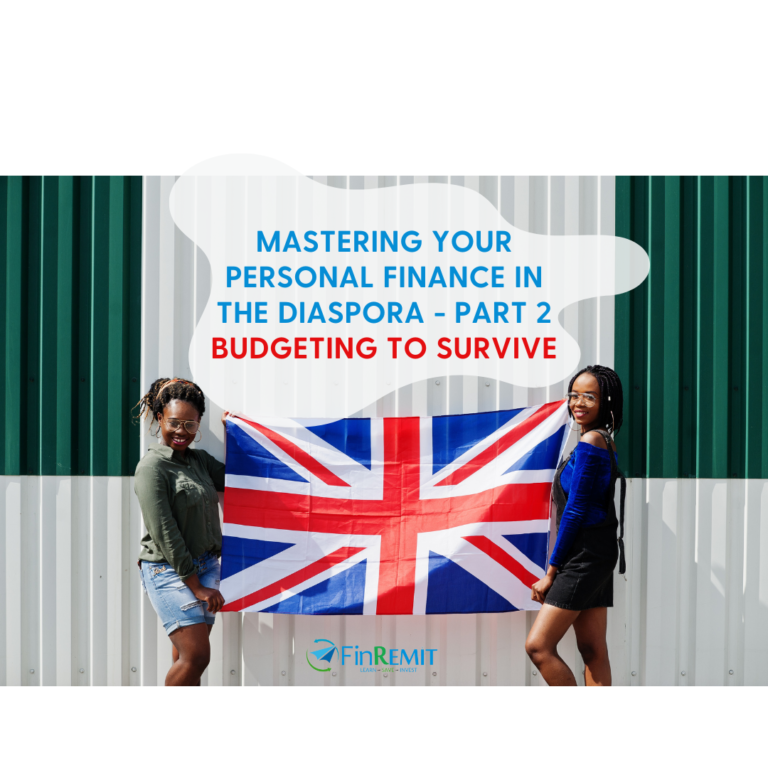Master Your Personal Finance – Intro

Mastering Your Personal Finances: Shola’s Journey from Nigeria to the USA
By FinREMIT
Introduction
Shola had always dreamed of living in the United States. The allure of new opportunities, a better quality of life, and the chance to build a prosperous future for his family drew him from Nigeria to the land of opportunity. However, soon after landing in the bustling city of New York, Shola realized that his dreams came with a hefty price tag. Bills began to pile up, and his modest income seemed insufficient to cover his expenses. This is Shola’s story of mastering personal finances, a journey of struggle, learning, and eventual triumph.
The Shock of Financial Reality
Upon his arrival, Shola was overwhelmed by the high cost of living in the USA. Rent, utilities, transportation, and food were significantly more expensive than what he was used to in Nigeria. Shola’s job as a junior IT specialist paid decently, but it barely covered his living expenses. He had little left over for savings, emergencies, or the occasional indulgence.
Step 1: Understanding the Landscape
The first step in Shola’s financial journey was to understand his financial landscape. He began by listing all his income sources and expenses. This simple exercise was an eye-opener. Shola realized that he was spending more than he was earning, thanks to unplanned expenses and the high cost of living.
Step 2: Setting Clear Financial Goals
Shola knew he had to set clear, achievable financial goals. He divided his goals into short-term and long-term categories. Short-term goals included saving for emergencies and paying off credit card debt. Long-term goals involved saving for a home and investing for the future. Having these goals in mind gave Shola a sense of direction and purpose.
Step 3: Creating a Budget
With his goals set, Shola created a budget. He used the 50/30/20 rule as a guideline: 50% of his income for needs (rent, utilities, groceries), 30% for wants (eating out, entertainment), and 20% for savings and debt repayment. Shola meticulously tracked his spending using a budgeting app, which helped him stay within his limits.
Step 4: Cutting Down Expenses
To balance his budget, Shola needed to cut down on unnecessary expenses. He started by identifying areas where he could save money:
1. Housing: Shola found a more affordable apartment further from the city center. The commute was longer, but the rent savings were significant.
2. Groceries: He switched to shopping at discount stores and bought items in bulk to save money.
3. Transportation: Instead of taking cabs, Shola relied more on public transportation and even started biking to work.
4. Entertainment: He reduced his dining out and instead cooked at home, discovering a hidden talent for cooking Nigerian dishes.
Step 5: Increasing Income
Shola realized that cutting expenses alone wasn’t enough; he needed to increase his income. He took on freelance IT projects in his spare time, which provided an additional income stream. He also attended professional development courses to enhance his skills, making him eligible for promotions and better-paying jobs in the future.
Step 6: Building an Emergency Fund
One of Shola’s short-term goals was to build an emergency fund. He aimed to save three to six months’ worth of living expenses. By consistently setting aside a portion of his income, he gradually built a financial cushion, which gave him peace of mind knowing he could handle unexpected expenses without going into debt.
Step 7: Paying Off Debt
Shola had accrued some credit card debt shortly after his arrival. He prioritized paying off this high-interest debt to avoid accumulating more interest charges. Using the debt snowball method, Shola paid off his smallest debts first while making minimum payments on larger ones. This strategy kept him motivated as he saw his debt decrease over time.
Step 8: Saving and Investing
Once his debt was under control, Shola shifted his focus to saving and investing. He opened a high-yield savings account for his emergency fund and started contributing to a retirement account. Shola also began learning about the stock market and other investment opportunities, diversifying his portfolio to ensure long-term financial growth.
Step 9: Continuous Learning and Adaptation
Mastering personal finances is an ongoing process. Shola continued to educate himself about financial management through books, online courses, and financial seminars. He also adapted his financial plan as his circumstances changed, ensuring that he stayed on track to meet his goals.
Hypothetical Income Distribution Using the 50/30/20 Rule
To illustrate how Shola can manage his finances using the 50/30/20 rule, let’s assume he earns $2,500 per month and his rent is $1,800. Here’s how he should plan his income distribution:
1. Needs (50% of Income):
– Monthly Income: $2,500
– Needs: $2,500 x 50% = $1,250
Shola’s rent of $1,800 exceeds the 50% allocation for needs. This indicates he needs to either find a cheaper place to live or adjust other expenses drastically to fit within this guideline. For instance, if he reduces rent to $1,250, he stays within the limit for needs.
2. Wants (30% of Income):
– Monthly Income: $2,500
– Wants: $2,500 x 30% = $750
With $750 allocated for wants, Shola can spend on dining out, entertainment, and other non-essential items. If his rent is too high, he might need to cut back on wants to balance his budget.
3. Savings and Debt Repayment (20% of Income):
– Monthly Income: $2,500
– Savings and Debt Repayment: $2,500 x 20% = $500
Shola should allocate $500 monthly to savings and debt repayment. This will help him build an emergency fund and pay down any outstanding debts.
Conclusion
Shola’s journey from Nigeria to the United States was marked by challenges, but it also offered valuable lessons in financial management. By understanding his financial situation, setting clear goals, creating a budget, cutting expenses, increasing his income, building an emergency fund, paying off debt, and investing for the future, Shola transformed his financial outlook. His story is a testament to the power of financial education and discipline, and it serves as an inspiration for other migrants facing similar challenges.
At FinREMIT, we believe in empowering migrants like Shola with the knowledge and tools they need to achieve financial stability and success. By mastering your personal finances, you can turn your dreams into reality and make a lasting impact on your life and the lives of those around you. Remember, it’s not just about earning more; it’s about making the most of what you have and building a secure future. Keep learning, keep growing, and keep striving for financial excellence.


